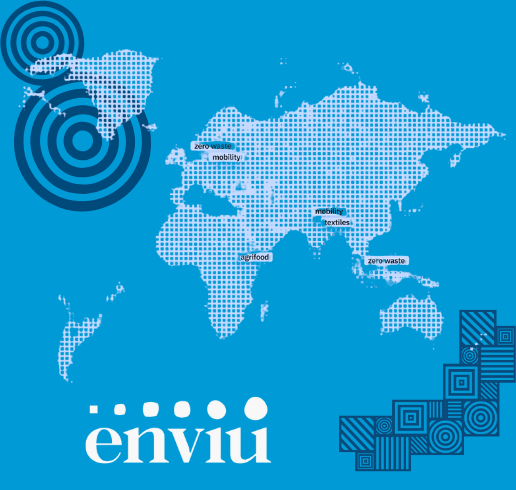
How a Dutch venture builder learned to scale impact through ecosystem thinking, blended finance, and circular business models
By DIEUWERTJE NELISSEN and RACHAEL KIRUI
Philanthropy has long played a vital role in tackling pressing global challenges—seeding initiatives, funding innovation, and absorbing early-stage risk. But to create enduring, scalable solutions, impact needs more than a strong start—it needs a cohesive ecosystem.
At Enviu, our 20-year journey has shown that while philanthropy can spark transformative work, it’s market-driven solutions—embedded in supportive systems and partnerships—that carry it forward. As we rebrand, we’re reaffirming a vision: real systemic change is catalyzed by business, supported by philanthropy, and sustained by a web of committed stakeholders.
Shifting from Standalone Ventures to Systemic Interventions
When Enviu launched in 2004, we began by building one venture at a time, asking: How can we solve this problem? But we soon learned that even strong standalone innovations rarely shift entire systems. Lasting change demands a portfolio of interconnected solutions across value chains.
Since 2016, we’ve adopted a systems perspective—mapping entire industries, identifying root causes, and zeroing in on leverage points where entrepreneurial models can catalyze transformation. We’ve realized that venture building is just one part of the equation. For enterprises to scale and endure, they must be embedded within enabling ecosystems—with aligned partners, infrastructure, and policy support.
This evolution has shaped our methodology over the past decade. We now combine venture building with ecosystem building to pursue systemic change.
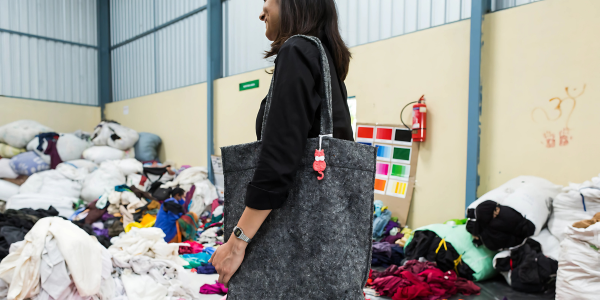 Case Study: The Good Felt
Case Study: The Good Felt
India generates an estimated 3.94 million tonnes of post-consumer textile waste annually—much of it low-value polyblends that rarely get recycled. Rather than propose a one-off recycling fix, Enviu reimagined the entire value chain.
Working with independent waste management partners like Hasiru Dala and Saahas Zero Waste, The Good Felt created a regenerative model: hard-to-recycle garments are collected and sorted, then processed into high-quality felt sheets used in insulation, packaging, fashion, and design. This not only diverts waste from landfills, but also creates new income streams for informal waste pickers—historically excluded from this part of the chain.
Building Ventures and Shaping Systems
Today, we intervene by launching impact businesses and by shaping the systems around them. We convene corporates, mobilize policymakers, forge infrastructure partnerships, and elevate public awareness.
Our Zero Waste packaging venture, Alner, exemplifies this dual approach. In Indonesia, Alner partners with micro-retailers to promote reuse and refill models that reduce reliance on single-use sachets—a major source of plastic pollution in Southeast Asia. In 2024, Alner was invited to present its model at the UN SEA of Solutions conference in Bangkok, where CEO Bintang Ekananda shared insights on scaling circular solutions in the Global South.
Financing the “Valley of Death”
Philanthropy allowed us to explore issues before they reached market or policy agendas. In early ideation, grants gave us the space to pursue bold ideas without the pressure of immediate returns. As ventures matured, commercial investment became essential for scale.
But in between lies a difficult phase often called the “valley of death”—where ventures have traction but not yet sustainable revenue. To bridge this gap, we’ve pioneered the use of convertible and repayable grants and blended finance structures, combining philanthropic patience with private sector incentives.
Case Study: SokoFresh
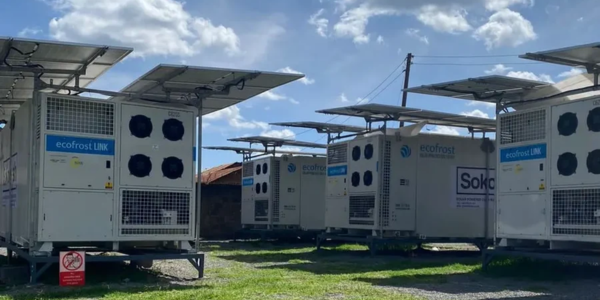 In Kenya, SokoFresh was born from Enviu’s efforts to reduce post-harvest losses in smallholder agriculture. Early grant funding from PREO (backed by the IKEA Foundation) enabled pilots of mobile solar-powered cold rooms and a digital market linkage platform. We worked with over 1,500 farmers across avocado, mango, and French bean value chains—cutting post-harvest losses to under 2%, compared to the typical 30–40%.
In Kenya, SokoFresh was born from Enviu’s efforts to reduce post-harvest losses in smallholder agriculture. Early grant funding from PREO (backed by the IKEA Foundation) enabled pilots of mobile solar-powered cold rooms and a digital market linkage platform. We worked with over 1,500 farmers across avocado, mango, and French bean value chains—cutting post-harvest losses to under 2%, compared to the typical 30–40%.
With operational success established, SokoFresh attracted scale-up capital from a mix of performance-based and private investors. A catalytic equity investment by Acumen, through its PEII+ energy initiative, helped expand operations across Kenya. This journey illustrates how catalytic philanthropy, blended finance, and impact investment can build sustainable, scalable businesses that transform supply chains.
Our Method: From Insight to Execution
Unlocking capital is essential—but it’s not enough. Without a deliberate process to shape ventures within complex systems, even the most promising ideas can falter. Our venture-building method ensures every dollar of capital is matched with executional discipline and contextual insight.
We begin with deep issue analysis, led by regional teams embedded in their local markets. Using human-centered design, we co-create solutions with the communities closest to the problem, uncovering root causes. From there, we prototype rapidly—testing, learning, and iterating until ventures show both commercial and impact viability.
Another good example is Alner, which launched in 2020 with a bold mission: to make reuse and refill systems work for everyday Indonesians. Knowing real change couldn’t come from top-down solutions, our co-founder Bintang immersed himself in warungs, the micro-retailers central to neighborhoods, observing routines and asking why past refill efforts had failed.
Community conversations revealed trust and convenience as major barriers, so we co-created a deposit-return model with easy return points and meaningful rewards. After piloting and refining it through multiple iterations, return rates climbed above 64%, proving that community-led innovation can drive real behavior change and make reuse systems both impactful and commercially viable.
Each initiative passes through clear stage gates, guided by input from an international advisory board. This structure keeps us aligned with our long-term mission: to drive systems change by building inclusive, sustainable economies.
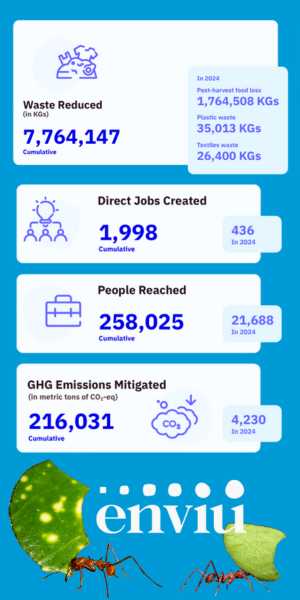
Enviu’s Key Lessons for System Change
1. Start With the Problem, Stay for the Long Haul
We don’t tack a social mission onto conventional business models. Each Enviu venture is born from real-world challenges, co-developed with communities, and anchored in the systems they aim to transform. From ideation to scale, we remain hands-on—co-investing, holding shares, and working shoulder-to-shoulder with local teams to navigate policy and partnerships. This long-term commitment ensures ventures stay focused on the problem, not just the product.
2. Share Power With Those Closest to the Problem
Systemic change stalls when decisions are made far from the ground. We’ve learned that power imbalances block innovation. That’s why we invest in diverse regional teams, governance structures that grant real autonomy, and feedback loops that keep learning bi-directional. When local innovators have decision-making power, solutions become more resilient and culturally relevant.
3. Make Every Partner’s Role Clear
To build complex solutions, you need complex collaborations. But potential partners often asked us: Are you an accelerator? An investor? A nonprofit? To clarify our value, we rebranded. Our new identity reflects a constellation of roles—entrepreneurs, recyclers, funders, corporates, and community groups—all represented as unique shapes contributing to a circular, regenerative economy. Our message: Enviu is not just a venture builder, but a platform for system change.
Let’s Multiply Impact
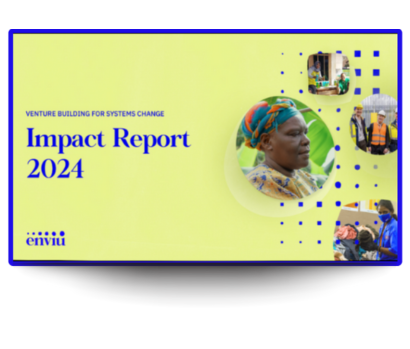 In June, Enviu published its first-ever consolidated impact report, highlighting tangible outcomes from two decades of venture building. This report is both a milestone and a call to action: to scale what works, together with partners committed to building economies that serve both people and planet.
In June, Enviu published its first-ever consolidated impact report, highlighting tangible outcomes from two decades of venture building. This report is both a milestone and a call to action: to scale what works, together with partners committed to building economies that serve both people and planet.
Call to the ANDE community
“What if we scaled change together?
You bring insight, capital, and local leadership. We bring twenty years of experience translating ideas into systemic impact.”
Contact: dieuwertje@enviu.org
Let’s build, fund, and scale the markets our future needs.
Interested in ecosystem transformation and not an ANDE member? Learn more about the benefits of membership. Subscribe to ANDE’s newsletter for updates on the agenda, speakers, and registration for the Global Annual Conference 2025.
